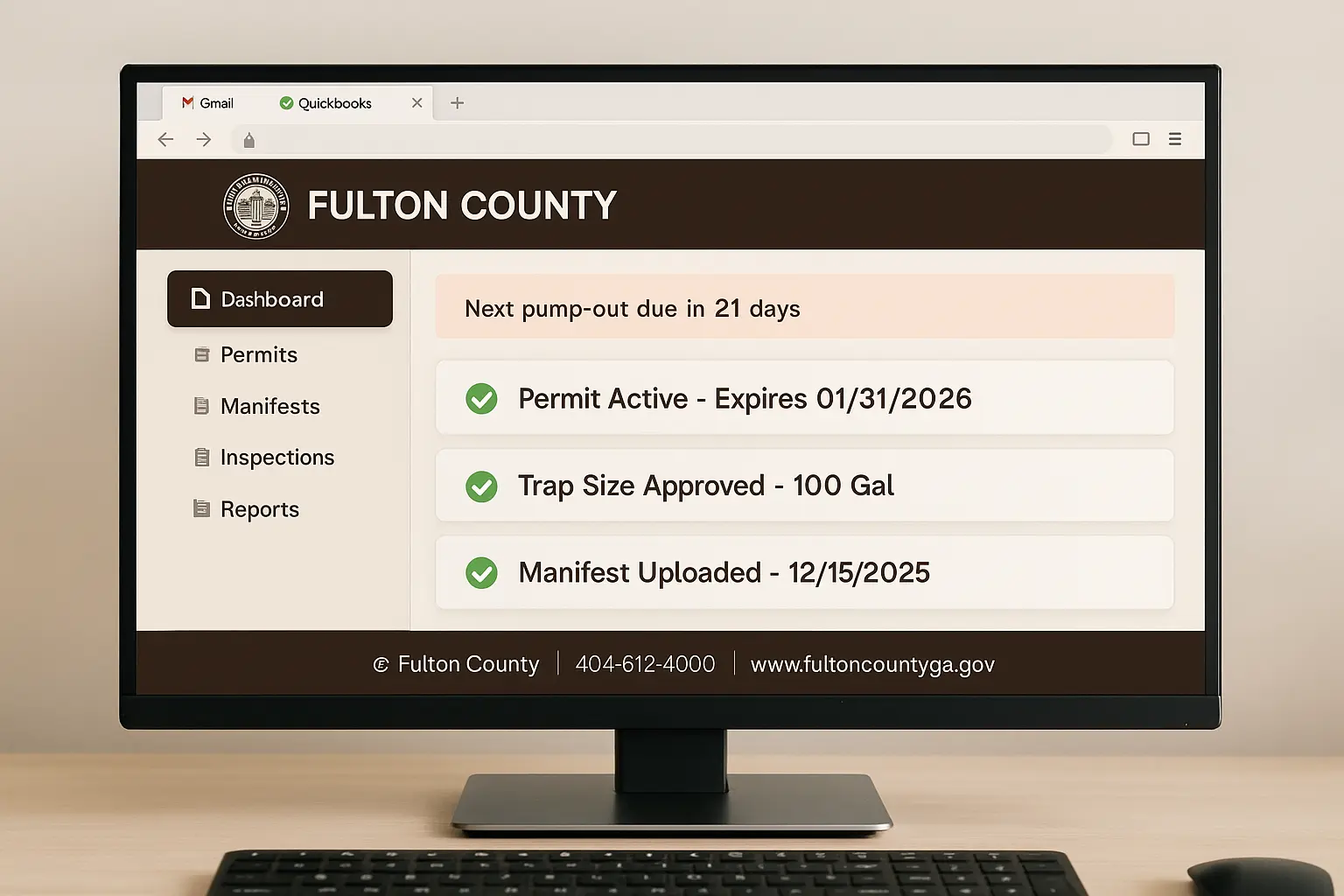Table of Contents
Atlanta’s Hidden Grease Risk
Sewer crews pull more than 50 tons of congealed fat from Atlanta pipes every year, enough to fill three box trucks and to cost the city over $2 million in emergency jet vac work. Georgia’s Water Quality Control Act lets regulators fine up to $50,000 for each day an illegal discharge continues. Fulton County inspectors can also freeze your alcohol license renewal if service manifests are missing. Taken together, those penalties turn “just grease” into a genuine business risk. This guide translates the legal wording into everyday tasks and shows how selling your used cooking oil, rather than dumping it, protects sewers and adds a new revenue stream.
Know The Rules Before You Fry
Every food service business, including food trucks, must obtain Fulton’s Commercial Waste Discharge Permit and list its grease trap location in the online Pretreatment portal. The City of Atlanta requires an exterior grease interceptor sized under Code Section 154 297.01 before plumbing approval. Once installed, traps must be pumped every 90 days or when fats, oils, and grease plus solids reach 25 percent of capacity as spelled out in Section 154 297.03, whichever comes first. Haulers moving your oil off site must display a Georgia transporter ID under Rule 391 3 6 .24, and they must upload each manifest to the county portal within ten days.
The Four Step Compliance Timeline
Atlanta codes read like legal algebra, but the action items fit on one calendar.
| Task | Deadline | Enforcer | Fine if Missed |
|---|---|---|---|
| Permit renewal | 31 Jan yearly | Fulton Pretreatment | $250 plus citation |
| Routine pump out | 90 days or 25% or less | City inspector | $300 first, $900 repeat |
| Manifest upload | 10 days post service | County portal | Permit hold |
| Transport log | Every haul | Georgia EPD | Up to $50k/day |
Containers That Stop Thieves
Grease is “liquid gold.” A Gwinnett based ring siphoned thousands of gallons from metro tanks in early 2025, selling the haul for quick cash. Each 300 gallon bin is worth about $1,400 on the black market, and rushed siphoning often splashes oil directly into storm drains, making you liable for cleanup. Grease Connections combats that risk with RFID sealed lids, GPS monitored cages, and 24 hour pickup windows that shorten the time oil sits outside.
| Capacity | Best For | Security Feature | Service Method |
|---|---|---|---|
| 70 gal | Food trucks | Lock bar | Hand pump |
| 140 gal | Strip mall kitchens | RFID lid | Vacuum hose |
| 300 gal | Hotels & banquets | GPS cage | Pump truck |
| 500 gal | Stadiums | Steel barricade | Pump truck |
Where Your Oil Goes & Why It Matters
Oil collected in Atlanta does not head to the landfill. Clean Energy Biofuels in nearby Athens turns fryer oil into ASTM certified biodiesel that cuts lifecycle emissions by 80 percent. DAR PRO supplies renewable feedstock to produce sustainable aviation fuel for Delta’s carbon reduction program. Partnering with a licensed hauler guarantees a transparent cradle to fuel chain and produces digital carbon certificates, exactly what franchise HQs and bank ESG audits now request. Inspectors also like to see that complete paper trail, meaning cleaner pipes and fewer compliance surprises.
Flood Season & Emergency Spill Response
Georgia’s summer storms can dump two inches of rain in an hour, turning parking lot grease into a rainbow slick that flows straight to storm drains. Fulton County may charge spillers for vacuum truck cleanup plus a per gallon sewer surcharge. Grease Connections installs hurricane rated tanks anchored to concrete pads and maintains an on call spill team with absorbent booms and wet vacs so your kitchen reopens faster. Call us as soon as a valve fails; we can dispatch within two hours anywhere inside I 285 and file the mandatory incident report with Watershed Management on your behalf.
Quick FAQ
“How often do I pump my grease trap in Atlanta?” – Every 90 days or sooner if grease hits 25 percent, per Code Section 154 297.03.
“What’s the fine for dumping oil in Georgia?” – Up to $50,000 per day under the Water Quality Control Act.
“Do food trucks need a grease permit in Fulton County?” – Yes; every mobile kitchen falls under the Commercial Waste Discharge Permit.
“Who hauls used cooking oil in Buckhead?” – Grease Connections holds a state transporter ID, uploads manifests within 10 days, and pays a market based rebate.
Next Steps: Schedule & Save
Compliance protects your license; rebates protect your margin. Grease Connections installs a theft proof tank within 72 hours, aligns pump dates with Fulton’s calendar, uploads every manifest automatically, and pays you for every gallon. One call eliminates surprise inspections, sewer backups, and theft headaches. Dial (770) 284-4646 or book online now to lock in cleaner pipes, cash back, and total peace of mind before the next lunch rush.









